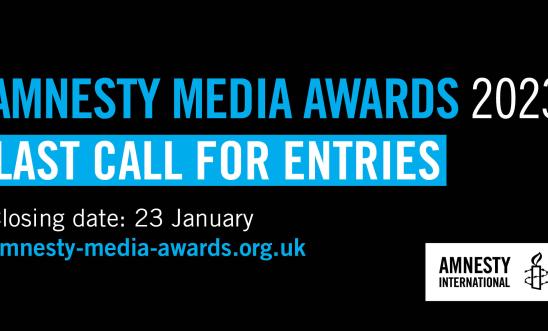
Press releases
Amnesty Media Awards 2023: Final call for entries

Closing date for entries is Monday 23 January 2023
Enter the awards: https://amnesty-media-awards.org.uk/
Amnesty International UK is making a final call for entries to its Media Awards, a prestigious set of awards that recognise the vital role journalists play and the serious risks they face in highlighting human rights abuses around the world.
The closing date for entries is Monday 23 January and the award ceremony will take place at Amnesty UK’s Human Rights Action Centre in London on Wednesday 26 April 2023.
Entries must be from a media outlet based in the UK and published or broadcast for the first time in the UK between 1 January and 31 December 2022. Entries can be submitted at: https://amnesty-media-awards.org.uk/ .
A high-profile set of judges – including Sky News’ Alex Crawford, Channel 4’s Nevine Mabro, 5 News’ Cait FitzSimons, the Guardian’s Annie Kelly and Times Radio’s Matt Chorley - have already been confirmed for what will be the organisation’s 31st Media Awards.
A list of the categories, confirmed judges and previous winners can be found below here.
Categories
Written News: A single written word news report on a current and/or breaking story relating to a human rights issue. This can be print, online or multimedia.
Broadcast News: A single film news report on a current and/or breaking story relating to a human rights issue. Two additional pieces may be included as supporting material. This can be TV or online. The entry should be no longer than 10 minutes.
Investigation: An outstanding piece of investigative journalism relating to human rights issues across all media. This can be print, broadcast, online or multimedia and may be a single report or a number of items covering the same story. If part of an on-going investigation, pieces from previous years can be included as supporting evidence, but only those from 2022 will be judged.
Features: A written word newspaper, magazine, online or multimedia piece that creatively explores human rights issues.
Radio & Podcasts: This can be either excerpts from a series, a full-length radio documentary or podcast, a news report or compilations from a magazine programme which observe and report on human rights issues. The whole entry (including compilations) should be between 15 – 60 minutes duration. These must have been broadcast or available online.
Best Use of Digital Media: Innovative/creative presentations of human rights issues using digital tools and/or multimedia techniques to creatively uncover or engage people in a human rights story or issue. Entrants must have been published for the first time or have had substantial fresh content published during 2022. Click here for previous entries, for reference.
Photojournalism: A single photograph or a series of up to 12 photographs covering a human rights issue. These must have been published by a UK media outlet (newspaper, magazine or online). Only the entered piece will be judged, but overall impact will be considered if published elsewhere and submitted as supporting material. This category is free to enter.
Student Journalist: Open to students in full-time education at a UK university, higher education or further education college at the time of publication or broadcast of their entry. Entries of up to three pieces covering human rights issues, may be in print, online or broadcast via a student outlet. Personal blog posts or entries from a commercial outlet are not eligible for entry. Finalists will be asked for evidence that they were a student at the time of publication (eg: via a reference from a tutor). This category is free to enter.
Nations & Regions: This category is open to any UK regional media outlet and can be print, online or broadcast. Entries may cover global or regional human rights issues. This category is free to enter.
The Gaby Rado Award for New Journalist: This is a judges’ choice category chosen across all shortlisted entries. As with the Outstanding Impact Award, the winner will have demonstrated impact in addressing human rights issues and shown commitment and excellence in reporting. It will be awarded to a journalist who has been working for five years or less in paid employment as a journalist. This award was established with the help of the family, friends and colleagues of the journalist Gaby Rado, who died in Iraq in 2003.
Outstanding Impact Award: This is a judges’ choice category, chosen across all shortlisted entries. The winner will have demonstrated impact in addressing human rights issues and shown commitment and excellence in reporting.
Entries and fees:
For more information on how to enter, the entry criteria and fees, visit: https://amnesty-media-awards.org.uk/
To encourage a wide range of entries, we have established a sponsorship fund to support a limited number of entries from freelance journalists and filmmakers, as well as small digital and broadcast outlets. See the website for more details.
Entries to Regional Media, Photojournalism and Student Journalist categories are free.
A list of previous winners can be found here.